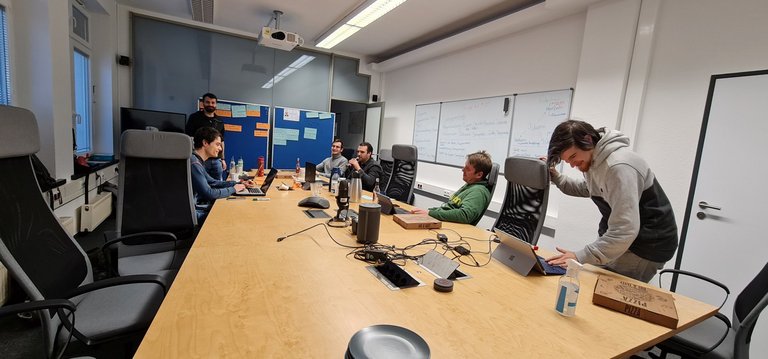How can the employees of the TU Ilmenau be motivated to save more energy in their daily work? How can peak loads in laboratory work be reduced? And can an optimal, resource-efficient utilization of space be achieved? Students from the "Electrical Engineering and Information Technology"" and "Electric Power and Control Systems Engineering" study programs addressed these and similar questions in a three-day hackathon and presented their solutions to the university.
An "energy trainer" for TU Ilmenau: students present results of a three-day hackathon on energy and innovation research

The hackathon is part and highlight of the course "EFI 1", which deals with innovation methods and energy research. The challenge at the end of the course was: "Design and implement a prototypical energy trainer that helps the TU Ilmenau to identify energy consumers and find solutions how to use them in a more cost-saving way." The task was to be solved as part of a collaborative software and hardware development event.
The goal of the event is for the students to develop a product within a very short time and from scratch and 'sell' it in a final presentation
,explains Nadja Hiersemann, a staff member at the Power Systems Group.
To do this, they not only have to develop a good concept and a prototype, but also constantly put themselves in their customers' shoes.
So questions come up like: What solutions already exist? Which existing resources can be used? How much effort is required and what can be automated? How expensive would it be and would there be more cost-effective alternatives? Agile project management methods are used: while members of the department take on the role of "product owner", one of the students takes on the position of the so-called "Scrum Master" and tries to organize and manage the team, consisting of the other students, over the three days. Time management is completely up to the students, as Nadja Hiersemann explains:
A large proportion of the students are always surprised at how much can be accomplished in three days and how well the teamwork works, even if some of the students did not know each other beforehand.
For example, as part of the assignment, the students dealt with the fact that they sometimes sat in threes in large lecture halls and asked themselves how teaching room planning could be optimized to avoid unnecessary heating of energy-inefficient rooms. However, they identified lab spaces as the biggest energy consumers and sought solutions to reduce peak lab loads. They also considered motivating employees to adopt energy-saving behavior in their day-to-day work to be an important factor in developing an "energy trainer".
Interdisciplinary thinking and working outside the box
With the follow-up event "Energy and Innovation Research 2 - EFI 2" in the upcoming summer semester 2023, the Power Supply Group is building on the hackathon experience and creating another learning space for students in which they can gain collaborative, interdisciplinary and creative practical experience and carry out their own project from the idea to the evaluation. The idea is to bring students from all majors together to form a team that is as interdisciplinary as possible.
The curriculum then includes the method of design thinking, and the students work together with external scientists and practice partners on another engineering problem in the context of energy research.
Design thinking is a holistic approach to thinking, working and thinking outside the box.
explains Prof. Dirk Westermann, who designed the course and supervises it together with colleagues:
It is based on the assumption that problems can be solved better when people from different disciplines work together creatively and develop ideas together to come up with solutions, right up to prototypes, for complex problems.
The focus is on the needs and requirements of the practice partners, who together with scientists form a jury that evaluates the results presented in a pitch. Prof. Westermann explains:
The early and intensive involvement of our students in research at the Thuringian Energy Research Institute, which unites 13 disciplines from four faculties, offers the best conditions for such interdisciplinary 'makerspaces'. Here, they can use their expertise to solve problems and transfer it to exciting application scenarios.
Contact
Prof. Dirk Westermann
Head of the Power Supply Group

